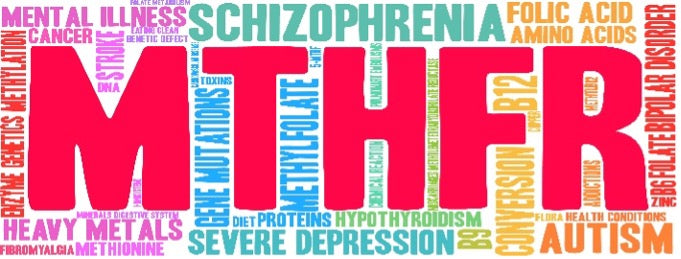Are Your Genes Putting You at Risk for Blood Clots?

A recent Substack article published by Dr. Peter McCullough brought forth some interesting observations regarding a genetic factor linked to increased blood clots in patients who have had COVID-19, or following COVID-19 vaccination.
This genetic mutation affects a surprisingly large sector of the population, anywhere from 8-20 percent of the general population.
According to Dr. McCullough:
“Internal medicine practice is flooded with new cases of blood clots, otherwise known as deep venous thrombosis of the legs or arms, sometimes traveling to the lungs causing acute chest pain, difficulty breathing, and in some cases fatal cardiopulmonary arrest.”
“Jukic et al have published a useful paper on the association between a common genetic factor, MTHFR and blood clots after SARS-CoV-2 infection or COVID-19 vaccination.
“Susceptibility to thromboembolic events in COVID-19, or following COVID-19 vaccination, is likely attributable to an interplay of factors, including a patient's baseline clinical status and comorbidities, alongside genetic risk factors. In Europe, 8-20% of the population are homozygous for the MTHFR (methylene tetrahydrofolate reductase) variant, which compromises folate metabolism and elevates homocysteine levels.
While heightened homocysteine levels are considered a risk factor for thromboembolic events, the precise clinical significance remains a contentious issue. However, recent research suggests elevated homocysteine levels may predict the course and severity of COVID-19 infection.” (1)
Dr. McCullough goes on to state:
“Many of these cases had serious blood clots requiring hospitalization, blood thinners, and sometimes surgical management. The important point of this paper is that a blood clot after infection or vaccination should be a call to check for the MTHFR mutation to obtain a prognosis, that is, an outlook for current and future blood clot events.”
And he recommends:
“The impact of having a loss of function mutation in the methylation of folate can be somewhat mitigated by administering methylated folate and vitamins B6 and B12. I commonly recommend a bioactive B-complex with methylated folate twice a day in MTHFR positive patients. Supplementation may not influence blood clotting, however, there is rationale for use in support of nervous system health and in circumstances where the gastrointestinal tract and bone marrow are under stress from intercurrent illness.”
What is the MTHFR variant and how does this affect health?
The MTHFR gene normally produces an enzyme that helps regulate homocysteine levels in the body. We all have 2 MTHFR genes, 1 inherited from each parent. Some people have a genetic mutation in 1 or both of their MTHFR genes.
The most common MTHFR mutation is called the MTHFR C677T mutation. Another common mutation is called MTHFR A1298C.
Depending on the type of mutation, the enzymes’ ability to regulate homocysteine levels can vary.
MTHFR mutations are also associated with low levels of folate, the active form of vitamin B9. (2)
Common Symptoms and Conditions Associated with MTHFR Gene Mutations
(There is debate about the health effects of the MTHFR mutations, however much research points to some interesting observations)
- Elevated Homocysteine Levels may increase risk of cardiovascular disease (heart attack, stroke, blood clots) and decreased intestinal motility. (3,4)
- Thyroid Disorders (5)
- Alzheimer’s disease (6)
- Bipolar and schizophrenia (7)
- Premature coronary artery disease (8)
- Spontaneous abortion and pregnancy loss (9)
- Neural tube defects and folate metabolism (10)
- Autism Spectrum Disorders (11)
- Possible link to gastrointestinal cancers (12)
Diagnosis and treatment
Testing for the MTHFR factor can either be done via blood test or cheek swab.
Consult your primary care provider for guidance. Along with a bioactive B complex that Dr. McCullough advises, a folate rich diet, along with lifestyle interventions (limit alcohol intake, avoid stress, exercise, etc.) may help alleviate symptoms.
Citations
- Jukic I, Heffernan A, Schelling AF, Kokic Males V, Savicevic NJ, Kovacic V. Association between COVID-19 Infection or Vaccination Outcomes and Methylenetetrahydrofolate Reductase Gene Polymorphism: A Systematic Review of the Literature. J Pers Med. 2023 Dec 5;13(12):1687. doi: 10.3390/jpm13121687. PMID: 38138914; PMCID: PMC10744904.
- Vidmar Golja M, Šmid A, Karas Kuželički N, Trontelj J, Geršak K, Mlinarič-Raščan I. Folate Insufficiency Due to MTHFR Deficiency Is Bypassed by 5-Methyltetrahydrofolate. J Clin Med. 2020 Sep 2;9(9):2836. doi: 10.3390/jcm9092836. PMID: 32887268; PMCID: PMC7564482.
- Ganguly P, Alam SF. Role of homocysteine in the development of cardiovascular disease. Nutr J. 2015 Jan 10;14:6. doi: 10.1186/1475-2891-14-6. PMID: 25577237; PMCID: PMC4326479.
- Givvimani S, Munjal C, Narayanan N, Aqil F, Tyagi G, Metreveli N, Tyagi SC. Hyperhomocysteinemia decreases intestinal motility leading to constipation. Am J Physiol Gastrointest Liver Physiol. 2012 Aug 1;303(3):G281-90. doi: 10.1152/ajpgi.00423.2011. Epub 2012 May 17. PMID: 22595990; PMCID: PMC3423105.
- Kvaratskhelia T, Abzianidze E, Asatiani K, Kvintradze M, Surmava S, Kvaratskhelia E. Methylenetetrahydrofolate Reductase (MTHFR) C677T and A1298C Polymorphisms in Georgian Females with Hypothyroidism. Glob Med Genet. 2020 Aug;7(2):47-50. doi: 10.1055/s-0040-1714091. Epub 2020 Jul 20. PMID: 32939515; PMCID: PMC7490122.
- Provider: Impact Journals, LLC TY - JOUR AU - Jiang, Yaling AU - Xiao, Xuewen AU - Wen, Yafei AU - Wan, Meidan AU - Zhou, Lu AU - Liu, Xixi AU - Wang, Xin AU - Guo, Lina AU - Liu, Hui AU - Zhou, Yafang AU - Wang, Junling AU - Liao, Xinxin AU - Shen, Lu AU - Jiao, Bin TI - Genetic effect of MTHFR C677T, A1298C, and A1793G polymorphisms on the age at onset, plasma homocysteine, and white matter lesions in Alzheimer's disease in the Chinese population JF - Aging JA - Aging (Albany NY) VL - 13 IS - 8 PB - Impact Journals, LLC SN - 1945-4589 UR - https://doi.org/10.18632/aging.202827 DO - 10.18632/aging.202827 SP - 11352 EP - 11362 PY - Y1 - /01/01 ER –
- El-Hadidy MA, Abdeen HM, Abd El-Aziz SM, Al-Harrass M. MTHFR gene polymorphism and age of onset of schizophrenia and bipolar disorder. Biomed Res Int. 2014;2014:318483. doi: 10.1155/2014/318483. Epub 2014 Jul 3. PMID: 25101272; PMCID: PMC4101969.
- Pr Zaghloul A, Iorgoveanu C, Desai A, Balakumaran K, Chen K. Methylenetetrahydrofolate Reductase Polymorphism and Premature Coronary Artery Disease. Cureus. 2019 Jun 27;11(6):e5014. doi: 10.7759/cureus.5014. PMID: 31497444; PMCID: PMC6716763.emature coronary artery disease
- Rai V. (2014). Methylenetetrahydrofolate reductase gene A1298C polymorphism and susceptibility to recurrent pregnancy loss: a meta-analysis. Cellular and molecular biology (Noisy-le-Grand, France), 60(2), 27–34.
- van der Put NM, Gabreëls F, Stevens EM, Smeitink JA, Trijbels FJ, Eskes TK, van den Heuvel LP, Blom HJ. A second common mutation in the methylenetetrahydrofolate reductase gene: an additional risk factor for neural-tube defects? Am J Hum Genet. 1998 May;62(5):1044-51. doi: 10.1086/301825. PMID: 9545395; PMCID: PMC1377082.
- Li, Y., Qiu, S., & Liu, Y. (2024). Association between MTHFR C677T/A1298C and susceptibility to autism spectrum disorders: a meta-analysis. BMC Pediatrics. Retrieved from BMC Pediatrics
- Mazzuca F, Borro M, Botticelli A, Aimati L, Gentile G, Capalbo C, Maddalena C, Mazzotti E, Simmaco M, Marchetti P. Effect of MTHFR Polymorphisms on Gastrointestinal Cancer Risk in Italy. World J Oncol. 2015 Aug;6(4):394-397. doi: 10.14740/wjon930w. Epub 2015 Aug 27. PMID: 28983337; PMCID: PMC5624687.
Written by Brooke Lounsbury





















